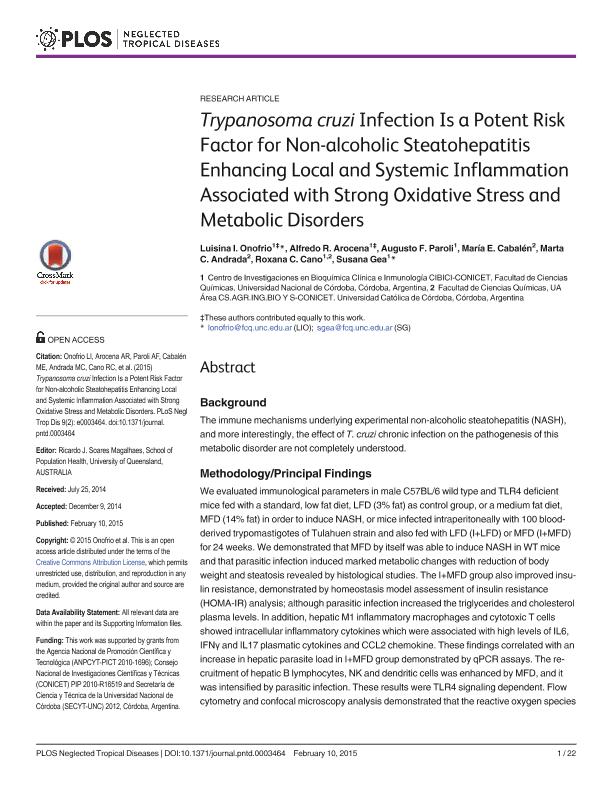Artículo
Trypanosoma cruzi Infection Is a Potent Risk Factor for Non-alcoholic Steatohepatitis Enhancing Local and Systemic Inflammation Associated with Strong Oxidative Stress and Metabolic Disorders
Onofrio, Luisina Inés ; Arocena, Alfredo Raul
; Arocena, Alfredo Raul ; Paroli, Augusto Fabián
; Paroli, Augusto Fabián ; Cabalén, María Eugenia
; Cabalén, María Eugenia ; Andrada, Marta Cecilia; Cano, Roxana Carolina; Gea, Susana
; Andrada, Marta Cecilia; Cano, Roxana Carolina; Gea, Susana
 ; Arocena, Alfredo Raul
; Arocena, Alfredo Raul ; Paroli, Augusto Fabián
; Paroli, Augusto Fabián ; Cabalén, María Eugenia
; Cabalén, María Eugenia ; Andrada, Marta Cecilia; Cano, Roxana Carolina; Gea, Susana
; Andrada, Marta Cecilia; Cano, Roxana Carolina; Gea, Susana
Fecha de publicación:
02/2015
Editorial:
Public Library of Science
Revista:
Neglected Tropical Diseases
ISSN:
1935-2735
Idioma:
Inglés
Tipo de recurso:
Artículo publicado
Clasificación temática:
Resumen
The immune mechanisms underlying experimental non-alcoholic steatohepatitis (NASH), and more interestingly, the effect of T. cruzi chronic infection on the pathogenesis of this metabolic disorder are not completely understood. We evaluated immunological parameters in male C57BL/6 wild type and TLR4 deficient mice fed with a standard, low fat diet, LFD (3% fat) as control group, or a medium fat diet, MFD (14% fat) in order to induce NASH, or mice infected intraperitoneally with 100 blood-derived trypomastigotes of Tulahuen strain and also fed with LFD (I+LFD) or MFD (I+MFD) for 24 weeks. We demonstrated that MFD by itself was able to induce NASH in WT mice and that parasitic infection induced marked metabolic changes with reduction of body weight and steatosis revealed by histological studies. The I+MFD group also improved insulin resistance, demonstrated by homeostasis model assessment of insulin resistance (HOMA-IR) analysis; although parasitic infection increased the triglycerides and cholesterol plasma levels. In addition, hepatic M1 inflammatory macrophages and cytotoxic T cells showed intracellular inflammatory cytokines which were associated with high levels of IL6, IFNγ and IL17 plasmatic cytokines and CCL2 chemokine. These findings correlated with an increase in hepatic parasite load in I+MFD group demonstrated by qPCR assays. The recruitment of hepatic B lymphocytes, NK and dendritic cells was enhanced by MFD, and it was intensified by parasitic infection. These results were TLR4 signaling dependent. Flow cytometry and confocal microscopy analysis demonstrated that the reactive oxygen species and peroxinitrites produced by liver inflammatory leukocytes of MFD group were also exacerbated by parasitic infection in our NASH model. We highlight that a medium fat diet by itself is able to induce steatohepatitis. Our results also suggest a synergic effect between damage associated with molecular patterns generated during NASH and parasitic infection, revealing an intense cross-talk between metabolically active tissues, such as the liver, and the immune system. Thus, T. cruzi infection must be considered as an additional risk factor since exacerbates the inflammation and accelerates the development of hepatic injury.
Archivos asociados
Licencia
Identificadores
Colecciones
Articulos(CIBICI)
Articulos de CENTRO DE INV.EN BIOQUI.CLINICA E INMUNOLOGIA
Articulos de CENTRO DE INV.EN BIOQUI.CLINICA E INMUNOLOGIA
Citación
Onofrio, Luisina Inés; Arocena, Alfredo Raul; Paroli, Augusto Fabián; Cabalén, María Eugenia; Andrada, Marta Cecilia; et al.; Trypanosoma cruzi Infection Is a Potent Risk Factor for Non-alcoholic Steatohepatitis Enhancing Local and Systemic Inflammation Associated with Strong Oxidative Stress and Metabolic Disorders; Public Library of Science; Neglected Tropical Diseases; 9; 2; 2-2015; 1-22; e0003464
Compartir
Altmétricas



